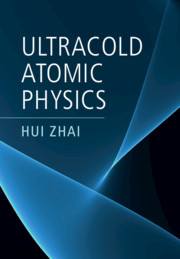3 - Interaction Effects
from Part II - Interacting Bose Gas
Published online by Cambridge University Press: 30 January 2021
Summary
1. Define Bose-Einstein condensation in an interacting boson system in term of macroscopic occupation.
2. Introduce the Gross-Pitaevskii equation and its applicable conditions.
3. Derive the hydrodynamic equations and various physical consequences of the hydrodynamics with or without harmonic trap.
4. Introduce sound wave and emphasize the difference between the wave behavior and the diffusive behavior.
5. Introduce the criterion for superfluidity and determine the superfluid critical velocity.
6. Introduce two-fluid hydrodynamics.
7. Introduce the Bogoliubov theory.
8. Introduce various concepts related to quasi-particle, including ground state as vacuum of quasi-particles, the zero-point energy of quasi-particle, quasi-particle lifetime and vacuum fluctuation.
9. Introduce healing length as the characteristic length scale for low-energy physics of an interacting Bose condensate.
10. Summarize the difference between an interacting and non-interacting Bose condensate.
11. Introduce the Bragg spectroscopy.
12. Show that the Bogoliubov theory fails in one-dimension due to the infrared divergence.
13. Discuss the basic idea of the Bethe-ansatz solution and the Tonks-Girardeau limit.
14. Introduce scale invariant quantum gases.
15. Introduce the Josephson effect and the self-trapping as two different transport phenomena driven by phase coherence.
16. Discuss the conjugate relation between the relative phase fluctuation and the relative particle number fluctuation, and show strong enough phase fluctuation renders the system into a Fock state.
17. Discuss an example of quantum measurement that can project two independent condensates to a coherent superposition state.
18. Discuss interference effects in density and density-density correlations.
19. Discuss the relation between the instability of the Sch\"odinger Cat state and the stability of symmetry breaking.
Keywords
- Type
- Chapter
- Information
- Ultracold Atomic Physics , pp. 73 - 117Publisher: Cambridge University PressPrint publication year: 2021

